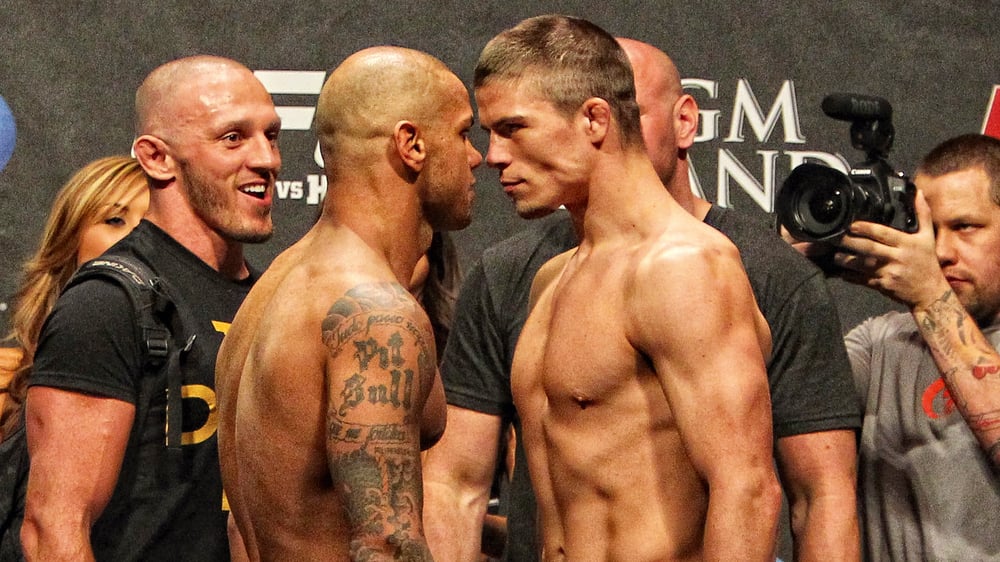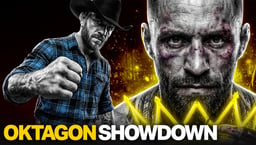
Issue 091
August 2012
For certain men, such as sought-after coach and nutrition expert Mike Dolce, their stories start in the most unexpected of places…
MIKE DOLCE Coach and nutritionist to MMA elite
I’ve had over 200 stitches in my face, I’ve lost over 42lb in six weeks for a fight, I’ve been in the hospital for 12 hours to get an X-ray for a shattered hand, I’ve gone weeks without seeing my family to prepare for a fight, and thousands of other sacrifices that only fighters would know. Blend that with my professional experience as a coach, and it puts me at a very unique vantage point.”
Few would argue with that assessment from former fighter Mike Dolce, now a coach and nutrition guru to MMA A-listers like Chael Sonnen, Vitor Belfort and ‘Rampage’ Jackson. Thanks to his successful Dolce Diet principals and weight-cutting methods, which allow his fighters to step onto the pre-fight scale not as drawn-out husks but as warriors full of vitality, in just two years he’s gone from little-known former Ultimate Fighter contestant to perhaps MMA’s most sought-after and talked-about fight camp addition.
Dolce believes in getting the majority of his clients’ nutrients via meals, not supplements, and if a food ingredient wasn’t around 200 years ago it doesn’t go on the plate. It’s a simple philosophy and one that found its genesis, along with a passion for nutrition, in the family home in Belmar, New Jersey. “I grew up in an Italian kitchen and your reputation lives and dies by the flavor of your sauce,” reveals Dolce.
Alongside his Sherdog fight record (a perhaps humble 5-10) he’s listed as being born in 1979. Not right says Dolce – although he’s coy about the real magic number. However he is open about some more unusual aspects of his early years. Mike’s father owned and trained thoroughbred racehorses, so when the future fighter wasn’t engaged in school sport, such as wrestling, he was on the farm.
“It was most likely my work with the horses that turned my coach’s brain on. I was always working. I grew up about three blocks from the Atlantic Ocean and began working on a commercial tuna boat at the age of nine. My time on the ocean went a long way to building my philosophy of using earth-grown nutrients.”
At 13 years old Dolce discovered a love for powerlifting (squatting over 500lb in his first competition) and by the mid ‘90s, at the close of his amateur-wrestling career, he was fully engrossed.

With practicing MMA not an accessible option, he was left with just being a fan. “Every pay day, my brother and I would drive 30 minutes to the Suncoast Video store at the mall to peruse the shelves for anything exciting. We probably owned every VHS version of Pride, King of the Cage, UFC and instructional video.” In fact, you could call Dolce a bit of an MMA pioneer. As a youngster he’d have “super fights” with his brother in the backyard. “We’d punch and wrestle until we could get the other one to say ‘uncle.’” And many years later, after achieving his goals in powerlifting, he went looking for a new challenge and found it inside a Renzo Gracie affiliate school 10 minutes from his house.
But his desire to fight came later. While working at Team Quest in Portland, Oregon, as head strength coach he decided he wanted to become a better trainer by learning what fighters go through. His pro career, which started in 2006, saw him battle between the ropes of M-1 and the IFL, taking on a list of talent: Mike Pierce (UFC), Antonio McKee (former MFC champ), Lyman Good (former Bellator champ), Karl Amoussou (Bellator).
And in 2008, Dolce fought his way onto the seventh series of The Ultimate Fighter, coached by Rampage Jackson and Forrest Griffin, where the show catalyzed a significant career shift. “Earning my spot on that season with a first-round knockout pretty much marked the end of my career as an athlete and my true beginning as a full-time coach,” he confesses. “Even on the show, I was more of a coach than anything else.”
He helped corner, and cooked post-weigh-in meals for every fighter on Team Rampage. He had discovered his true calling. But Dolce rejects the idea he is purely a nutritionist. “I’m a coach,” he asserts. Between managing weight cuts as well as co-ordinating and advising, food is just one string to his bow. So, considering his impressive clientele and the constant demand for his services, there must be a reason for his success. What makes him so special?
He adds: “I treat my athletes the way I wish I’d been treated by coaches, managers, and sponsors. I coach my athletes with the respect they deserve: not as a commodity or a paycheck, but as brothers.”










